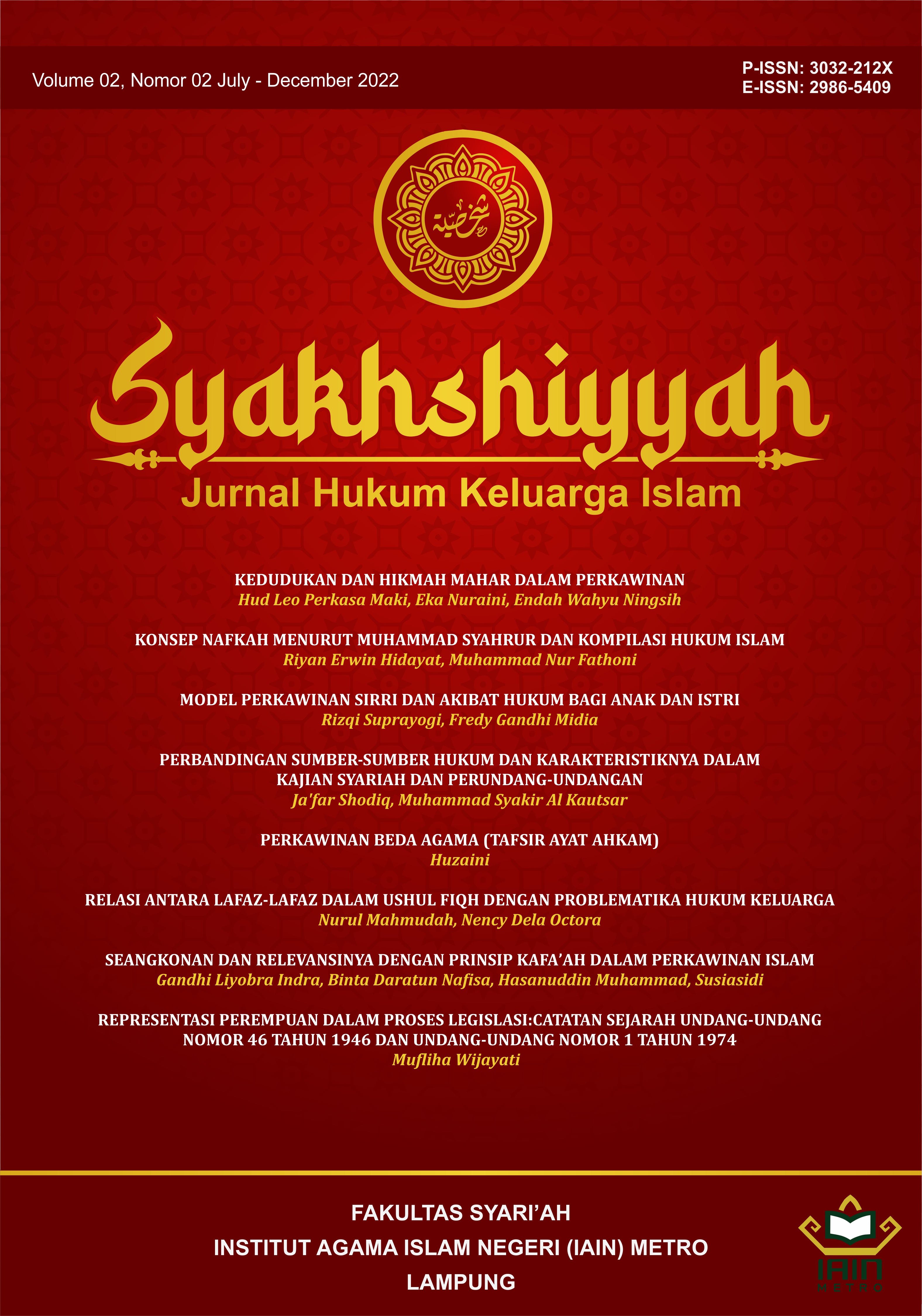Kedudukan dan Hikmah Mahar dalam Perkawinan
DOI:
https://doi.org/10.32332/syakhshiyyah.v2i2.6138Keywords:
Position, Wisdom, Marriage DowryAbstract
The dowry (mahr) is a significant element in the marriage contract, holding a distinct position in Islamic law. This study aims to analyze the position of the dowry in marriage and uncover the wisdom behind its provision. Using a normative-juridical approach and literature review, this research explores the legal basis of the dowry in the Qur'an, Hadith, and opinions of Islamic scholars. The study also highlights the social and religious implications of the dowry, including its role as a symbol of respect for women and as a form of the husband's responsibility. The findings indicate that the dowry is not merely a material gift but carries deep spiritual and social meanings, serving to strengthen the marital bond and protect the rights of the wife. The dowry also reflects the husband's responsibility in ensuring the welfare of his family. In conclusion, the dowry's position in marriage is highly significant from both Islamic legal and societal perspectives, and its provision holds broad wisdom for both parties in marriage.
References
Abdul Aziz Muhammad, Prof. Dr. Fiqh Munakahat. Jakarta: Amzah, 2017.
Abdul Rahman Ghozali. Fiqh Munakahat. Jakarta: Kencana Prenada, 2010.
Abdil Aziz Muhammad Azzam, dan Abdul Wahhab Sayyed Hawwas. Fikih Munakahat Khitbah Nikah dan Talak. Jakarta: Amzah, t.t.
Abd. Kafi. “Mahar Pernikahan dalam Pandangan Hukum Islam dan Pendidikan Islam.” Jurnal Paramurobi 03, no. 01 (Juni 2020).
Abd. Kohar. “Kedudukan Dan Hikmah Mahar Dalam Perkawinan.” Jurnal Hukum dan Ekonomi Islam, Juni 2016. https://doi.org/10.24042/asas.v8i2.1245.
Abd. Shomad. Hukum Islam Penorman Prinsip Syari’ah dalam Hukum Islam. Jakarta: Kencana, 2010.
Ahmad Rofiq. Hukum Perdata di Indonesia Edisi Revisi. Jakarta: PT Raja Grafindo Persada, 2013.
Apriyanti. “Historiografi Mahar dalam Pernikahan.” Jurnal Kajian Gender dan Anak 12, no. 02 (Desember 2017).
Departemen Agama RI. Al-Qur’an Dan Terjemahnya. Alih bahasa oleh Ahmad Toha Putra. Semarang: Asy Syfa’, 2007.
Ibnu Irawan, dan Jayusman. “Mahar Hafalan Al-Quran Perspektif Hukum Islam.” Jurnal of Social-Religion 4, no. 2 (Oktober 2019). https://doi.org/10.24256/pal.v4i2.804
Iqbal, Muhammad. “Konsep Mahar Dalam Perspektif Mazhab Imam Syafi’i.” Al-Mursalah 1, no. 2 (Juli 2015).
Nugroho. Tinjauan Umum Tentang Mahar. Semarang: UIN Walisongo, 2014.
Putra Halomoan. “Penetapan Mahar Terhadap Kelangsungan Pernikahan Ditinjau Menurut Hukum Islam.” JURIS 14, no. 02 (Juli 2015).
Saputri, Irdawati. “Mahar Perspektif Al-Qur’an dan Implementasinya pada Masyarakat.” Jurnal Ushuluddin Adab dan Dakwah 1, no. 1 (Agustus 2018).
Sofyan, Adi. “Mewajibkan Walimatul Urs’, Batasan Mahar dan Spekulasi Mahar Dijadikan Uang Dapur Dalam Pernikahan.” Jurnal Pemikiran Syariah dan Hukum 3, no. 2 (Oktober 2019). https://doi.org/10.52266/sangaji.v3i2.485
Subhan. “Nalar Kesetaraan Mahar dalam Perspektif Syariah Islam.” Jurnal Studi Keislaman 4, no. 1 (2017). https://doi.org/10.33650/at-turas.v4i1.193
Wahbah Az-Zuhaili. Fiqh Islam Wa Adillatuhu. Cet. 1. Alih bahasa oleh Abdul Hayyie al Kattani, dkk. Jakarta: Gema Insani, 2011.
Zurifah Nurdin. “Aksiologis Hadis Ahkam Tentang Mahar.” El-Afker 5, no. 2 (Juli 2016). http://dx.doi.org/10.29300/jpkth.v5i2.1129








